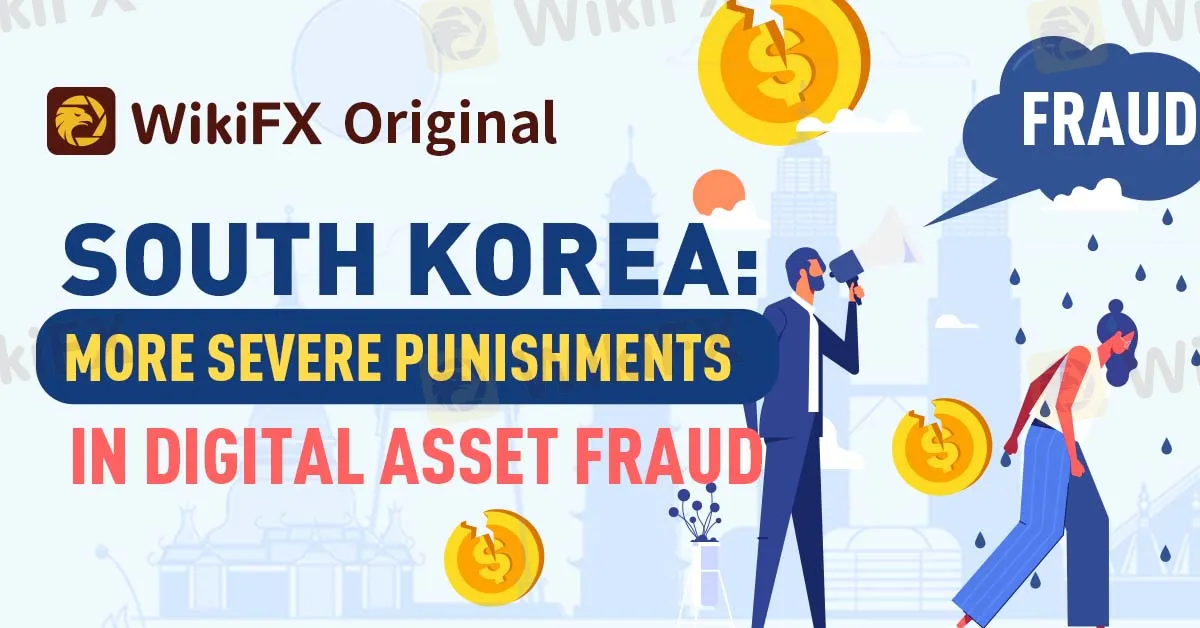简体中文
繁體中文
English
Pусский
日本語
ภาษาไทย
Tiếng Việt
Bahasa Indonesia
Español
हिन्दी
Filippiiniläinen
Français
Deutsch
Português
Türkçe
한국어
العربية
South Korea: More Severe Punishments in Digital Asset Fraud
Abstract:Regulations for the cryptocurrency market are increasingly crucial as fraud cases in the sector grow. However, the development of cutting-edge technologies has also brought up a number of drawbacks for the crypto industry. Most nations adopt restrictive measures in their approach in addition to developing regulatory agencies.

Regulations for the cryptocurrency market are increasingly crucial as fraud cases in the sector grow. However, the development of cutting-edge technologies has also brought up a number of drawbacks for the crypto industry. Numerous crypto-project crimes are carried out using technological procedures and platform flaws.
Most nations adopt restrictive measures in their approach in addition to developing regulatory agencies. Additionally, some have outlined penalties for perpetrators of cryptocurrency fraud and exploitation in respective jurisdictions.
Following the collapse of the Terra ecosystem this year, Korean authorities have taken new actions that focus on strengthening their legal framework. South Korean officials have announced plans to increase the severity of the penalties for cryptocurrency fraud. Currently, Do Kwon, the co-founder of Terraform Labs, is not only the subject of legal proceedings in South Korea and the US, but also he is facing a lawsuit of $57million-dollar lawsuit in Singapore.

Local media reports that the Financial Services Commission (FSC) and the National Assembly are working to pass a bill allowing financial authorities to supervise cryptocurrency exchanges and monitor unfair trade practices like using confidential information, price manipulation, and fraud.
They intend to adopt a bill that will make it easier for financial regulators to monitor and penalise unethical cryptocurrency trade operations. Price manipulation, the exploitation of confidential information, and fraud are examples of behaviours listed in the supervision of crypto exchanges.
The National Assembly has already circulated 14 ideas for additional crypto asset regulation. Additionally, work is being done on the comprehensive Digital Assets Basic Act. From 2023 on, increased investor protection is the goal.
Unnamed National Assembly officials claim that the US Securities and Exchange Commission (SEC) has a broad range of legislative authority. Therefore, penalising unfair trade in digital assets does not require distinct legislation. However, in Korea, appropriate legislation is necessary to do so.
The regulators have not yet given specifics regarding the penalties for breaking the law governing trading techniques. However, future designs are what is anticipated. Additionally, they will coordinate punishments and oversight at comparable and attainable levels in the conventional financial system.

Disclaimer:
The views in this article only represent the author's personal views, and do not constitute investment advice on this platform. This platform does not guarantee the accuracy, completeness and timeliness of the information in the article, and will not be liable for any loss caused by the use of or reliance on the information in the article.
Read more

Common Tactics Used in Online Trading Fraud Today
Know the top online trading scams of 2025, from fake apps to pump-and-dump tricks. Simple tips to spot and avoid them, keeping your money safe in this easy guide.

RM1.29 Million Lost in ‘C Baird VIP’ WhatsApp Scam
A 43-year-old company auditor and subcontractor in Malaysia became the latest victim of an elaborate investment scam after losing RM1.29 million to a fraudulent scheme promoted via WhatsApp.

U.S. March ISM Manufacturing PMI Released
The U.S. March ISM Manufacturing PMI data shows that manufacturing has contracted for the first time, and investors should pay attention to future changes and impacts on the sector.

Breaking News! Forex Inflows Surge to $17 Billion
Nigeria's foreign exchange inflows saw a significant increase in the fourth quarter of 2024, reaching $17.39 billion. This growth reflects strong foreign investments and export revenues, bringing new confidence to the market.
WikiFX Broker
Latest News
Exposing the Top 5 Scam Brokers of March 2025: A Closer Look by WikiFX
Gold Prices Climb Again – Have Investors Seized the Opportunity?
Webull Launches SMSF Investment Platform with Zero Fees
Australian Regulator Warns of Money Laundering and Fraud Risks in Crypto ATMs
The Withdrawal Trap: How Scam Brokers Lure Victims into Paying More
FCA to Investors: Think Twice Before Trusting These Brokers
Trump\s tariffs: How could they affect the UK and your money
Trump gambles it all on global tariffs he\s wanted for decades
HTFX Spreads Joy During Eid Charity Event in Jakarta
How Will the Market React at a Crucial Turning Point?
Currency Calculator







